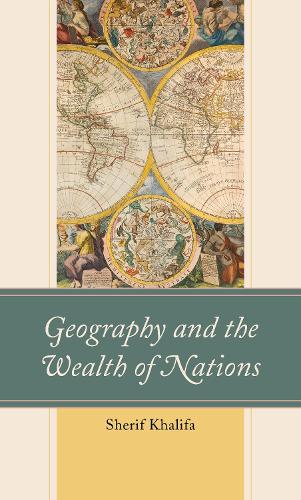
Geography and the Wealth of Nations
(Hardback)
Publishing Details
Geography and the Wealth of Nations
By (Author) Sherif Khalifa
Bloomsbury Publishing PLC
Lexington Books/Fortress Academic
17th March 2022
United States
Classifications
Professional and Scholarly
Non Fiction
Politics and government
Human geography
330.9
Physical Properties
Hardback
294
Width 160mm, Height 228mm, Spine 24mm
658g
Description
In Geography and the Wealth of Nations, Sherif Khalifa argues that geography influences the factors that determine economic performance, such as the quality of institutions, the adopted cultural values, the systems of governance, the likelihood of conflict, the historical experiences, and the integration into the global economy. This book discusses in detail how geographic features influence each of these factors and how these determinants, in turn, affect economic outcomes. Khalifa shows that we cannot fully comprehend the economic consequences of these factors without exploring their geographic origins. This effort is especially critical as the world faces unprecedented environmental challenges, including climate change, worsening natural disasters, resource depletion, soil degradation, deforestation, desertification, and loss of biodiversity. Given these drastic changes, this book provides powerful insight into how geographic determinants continue to shape global crises.
Reviews
This book is truly breath-taking. Sherif Khalifa has not only managed to survey the entire relevant literature connecting geography, culture, religion and institutions with economic growth and development, but also makes a convincing case for geography being the primary determinant of economic development. This book is highly recommended for anybody interested in the big picture and is mandatory reading for policy makers.
-- Stefan Voigt, The University of HamburgThere is a huge and very influential body of literature that argues that geography profoundly matters for economic development. Geography and the Wealth of Nations masterfully summarizes and takes stock of this diverse literature while also contributing important original insights. The topics it explores run the gamut from the impact of climate to that of diseases to topsoil to natural resources. It also responds, quite convincingly, to important criticisms against the geography thesis, including the claim that geography only has an indirect effect and that its legacies are blunted by the diffusion of technology across borders. Provocatively, Sherif Khalifa argues that, even if geography works through institutions or other mediating factors to affect capital accumulation and productivity, geography also explains differences in religion, language, culture, significant historical ruptures, politics, and even ethnicity. This is a provocative and much-needed contribution to the literature on not only economic development, but also political science, anthropology, sociology, history, and, of course, geography. It is a must read!
-- Victor Menaldo, University of WashingtonGeography lurks everywhere in the process of economic development, but its influence is far more subtle and controversial than correlations of latitude and income per capita would suggest. Readers of all kinds, from undergraduates to experienced scholars, will therefore derive enormous benefit from Sherif Khalifas lucid, comprehensive discussion of the direct and indirect effects of geography on the course of economic history.
-- Philip Keefer, principle economic advisor, Inter-American Development BankAuthor Bio
Sherif Khalifa is professor of economics at California State University, Fullerton.
